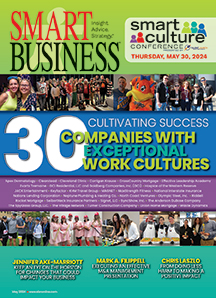Accountability counts
Mack’s final change-management lesson is this: Before embarking on any major change initiative, CEOs should ask themselves
if they are willing to be accountable, vulnerable and authentic to
the people around them — no matter the outcome.
“It’s important for CEOs to take accountability no matter
what happens because that kind of openness and honesty with
the organization creates alignment toward the mission and
vision, and no matter how involved you are, on some level,
when something goes wrong, you’re responsible,” Mack says.
“When you ask yourself what you could have done differently
when something doesn’t go well, it’s part of an iterative
process that causes you to ask what was the outcome you
intended and where it got off track.”
Accordingly, Mack admits to making a few mistakes along the
way.
Besides accepting responsibility for the company’s early difficulties with large-scale expansion, Mack says he was the major
architect of an ill-fated discount program designed to bring more
guests into the restaurants. While guest traffic did increase, only
half the goal was achieved because the meal price was too low
and the program wasn’t profitable. Afterward, he took responsibility and asked his staff for input about how discount programs
might work better going forward.
Creating a culture that embraces change without blame has
helped Garden Fresh accelerate growth. After opening a few new
locations in 2006 and 2007, the company plans to open nine new
restaurants in 2008 and at least four in 2009. The new growth
plan is the result of Mack negotiating through even more major
changes at Garden Fresh, including the private sale of the company to investment group Sun Capital in 2005 and the creation of
a new restaurant prototype in 2006.
An in-house team took on the task of creating a new concept
for the restaurants that would reinvigorate expansion by reducing the barriers to entrance and profitability thresholds. The
newly configured restaurant will allow more guests to dine in
less space and require fewer workers.
“Most of the recommendations came from an in-house team
because we’ve created a culture where people see the value in
change,” Mack says. “There were no sacred cows. Everything
was up for review, including how the restaurant was laid out and
the way the food is merchandised.”
Mack says that on occasion, conflict erupted within the group
as it debated prospective designs. In this case, he says, conflict
was a good thing because there’s benefit in considering numerous options as part of a major change initiative. Ultimately, the
team had to justify its creative concepts through financial models, and it also had to weigh customer feedback in making its recommendations.
For Mack, the success of the redesign initiative was indicative
of the reasons he initially chose the industry — because people,
not technology, will dictate the difference between success and
failure with the new restaurant model. All in all, that alone is proof-positive that his team remains aligned with his personal
goals.
“It always comes down to this: Are we all here for the same reasons, and are we all drawn to the same goals?” Mack says. “It was
a passion for people that originally drove me to this business, and
creating great returns is all about having the right people doing
the right things with the same set of priorities.”
HOW TO REACH: Garden Fresh Restaurant Corp., www.souplantation.com

